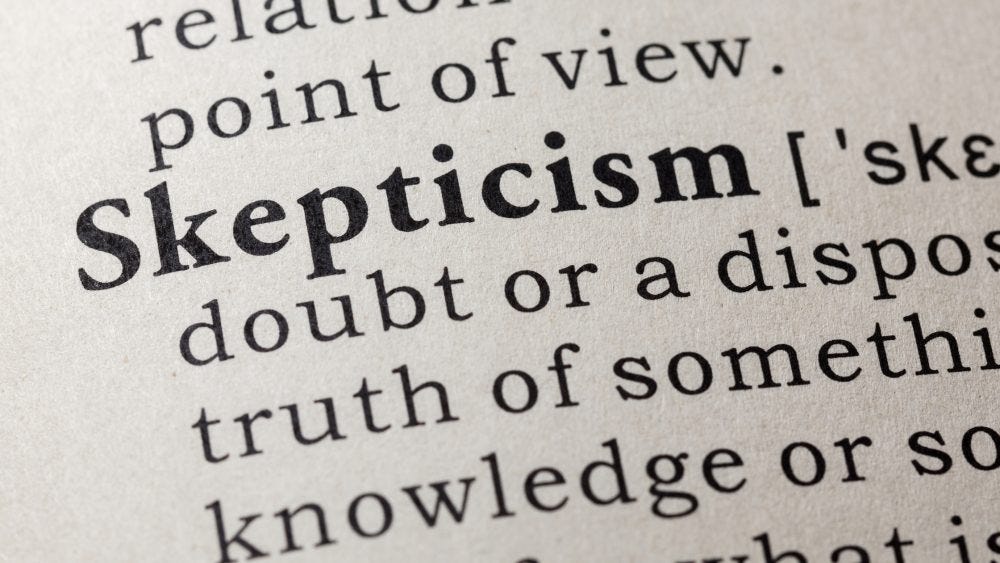Policymaker Ignorance…So What? (Part Three)
How to Respond to Policymaker Ignorance: In Defense of Policy Skepticism
This is the third and final installment in a multi-part series on possible responses to the problem of policymaker ignorance.
In the first part of the series, I considered the “epistemic-mechanistic” approach, which aims to mitigate policymaker ignorance and its consequences by facilitating the communication of relevant knowledge between policymakers and their constituents.
In the second part, I discussed the “constitutional” approach, which aims to make policymakers functionally omniscient and omnipotent by constitutionally constraining their range of political motion to the pursuit of policy goals with regard to which they are adequately knowledgeable and capable.
In this last part of the series, I argue that the appropriate response to the recognition that policymakers are relevantly ignorant with regard to some goal is (absent some reason to think spontaneous forces adequate to realize the goal despite policymaker ignorance) skepticism about the realization of the goal.
There are two questions that need to be addressed in this post. The first question concerns how policymakers should respond to recognition of their own ignorance. The second question concerns how constituents should react to policymaker ignorance.
How should policymakers respond to recognition of their own ignorance?
Let’s assume that policymakers really want to realize goals in their constituents’ interests. Let’s also assume that policymakers understand both the effects of ignorance on their incentives to pursue particular goals and the consequences of pursuing goals in the presence of relevant ignorance. That is, let’s assume that policymakers recognize both that second-order knowledge of their first-order ignorance regarding some goal makes the goal less attractive to pursue, other things equal, and that pursuing the goal despite their first-order ignorance is likely to end in failure, unless spontaneous forces intervene to compensate for their ignorance.
How should such policymakers react to the recognition of their relevant ignorance regarding some constituent-minded policy goal?
Before I address this question (and the second question below), I should remind readers of the caveat emphasized in the first part of this series about the relationship between a descriptive analysis, as my analysis of the consequences of policymaker ignorance is meant to be, and any normative conclusions that might seem to be suggested by the analysis. Simply put, normative conclusions – conclusions about what one should or ought to do – cannot be inferred from descriptive premises, unless some normative assumptions are added to the descriptive analysis.
In the present case, we need to add some normative premises like that policymakers should try to avoid false, if perhaps convenient, beliefs, that they should base their policy decisions on what they believe the truth to be, rather than on what they would like the truth to be, and that they should act to promote constituents’ interests as far as possible.
Given these assumptions and the analysis of the problem of policymaker ignorance, a few conclusions would seem to follow about the proper reactions of policymakers who recognize their relevant ignorance regarding some constituent-minded policy goal.
First, policymakers should be honest with constituents about their epistemic limitations, both in general and in the specific case at hand. Policymakers should say to constituents, in effect, “We don’t know enough to do this.”
Such honesty would clearly be in constituents’ interests, given that, if policymakers were correct about their relevant ignorance, the goal under discussion could be realized only with a degree of some kind of spontaneous intervention, which is to say, only if constituents contributed to its realization. It would not be in constituents’ interests to stoke their expectations for the realization of the goal through policy action when such action could not be effective without spontaneous, non-political, constituent-driven, intervention in the relevant causal nexus.
Second, policymakers should pursue whatever constituent-minded policy goals regarding which their knowledge and capacities are most adequate. That is, they should apply whatever policy-relevant knowledge they do possess where it is likely to do most good for constituents. In effect, policymakers should say to constituents, “We don’t know enough to do this, but we do know enough to do that.”
In short, policymakers who recognize their relevant ignorance and who are subject to the few seemingly reasonable normative assumptions stated above should be honest with constituents about their epistemic capacities. This would promote the realization of constituent-minded goals as far as possible under what may be quite deficient epistemic circumstances. It would encourage policymakers to deploy their knowledge where and when it could contribute to the realization of goals, and, at the same time, it would encourage constituents to find solutions to problems policymakers were too ignorant to help solve.
How should constituents respond to recognition of policymaker ignorance?
Let’s assume that constituents want their own interests to be promoted—not merely seemingly promoted, but really promoted. Let’s further assume that constituents understand the effects of relevant ignorance both on policymakers’ incentives to pursue specific goals and on the likelihood that goals regarding which policymakers are relevantly ignorant will be realized. In other words, let’s assume that constituents know that, when policymakers are ignorant regarding some goal, they are less incented to pursue it, other things equal, and its pursuit is likely to end in failure, unless spontaneous forces intervene.
Let’s again add the specifically normative assumptions that constituents should try to hold true beliefs, that they should base their policy preferences and policy demands on what they believe to be true, and that they should act to promote their own interests as far as possible, e.g., by rewarding and punishing policymakers in proportion to their capacity to promote constituents’ interests (rather than in proportion to their ability to pretend to promote constituents’ interests).
I again think we can draw a few significant conclusions from these assumptions and the analysis of the problem of policymaker ignorance.
First, constituents should be honest with themselves about their policymakers’ epistemic limitations and about the consequences of these limitations. Constituents should apportion their beliefs in the extent to which some goal is likely to be both earnestly, rather than merely insincerely, pursued, and realized, if pursued, to their assessments of policymakers’ relevant knowledge. Constituents should believe that policymakers will engage in earnest, rather than merely pretended, pursuit of the goal, and that pursuit of the goal will lead to its realization only to the extent they believe policymakers to be relevantly knowledgeable and capable.
Constituents should be skeptical otherwise, skeptical about both the sincere pursuit of the goal and its realization, if pursued. That is, constituents should withhold belief in both the political pursuit and realizability of goals that seem to require more knowledge or more capacity than policymakers can acquire.
Apportioning epistemic attitudes to their honest assessments of policymakers’ epistemic capacities is a method whereby constituents could preserve themselves and promote their own interests. It would put constituents on guard against the pretended pursuit of constituent-minded policy goals; it would shield constituents against political theater, in other words. It would also encourage constituents to insure against the likely failure of policy pursuits founded on inadequate knowledge or insufficient abilities, and to seek alternative, spontaneous, solutions to problems that policymakers could not solve given their relevant ignorance.
Second, constituents should further apportion their advocacy of the pursuit of particular policy goals to their apportioned beliefs about policymakers’ relevant knowledge and ignorance. Constituents who are truly interested in promoting their own interests have nothing to gain and quite a lot to potentially lose by advocating for the pursuit of goals that, in the first place, they have reason to believe policymakers will only, at best, pretend to pursue, and, in the second place, they take policymakers to be too ignorant or too incapable to do much to help realize.
Summary
Were policymakers and constituents to adopt the advice that seems to follow from the analysis of policymaker ignorance and a few seemingly reasonable normative assumptions, the political world might be a more honest space. We might observe less peacocking from policymakers who, were they to honestly assess their limitations and behave accordingly, would find little to peacock about. We might also see fewer and less vitriolic fights among constituents about the policies that should be pursued, given that, I think it’s not too quick to say, any honest assessment of policymakers’ epistemic capacities would mean the removal of many especially controversial potential policy goals from the political sphere. If we understood just how limited policymakers are in their knowledge and capabilities, and came to believe in and advocate for policy pursuits accordingly, we might have less to argue about.
A well-apportioned dose of policy skepticism might just make the world a slightly better place.





